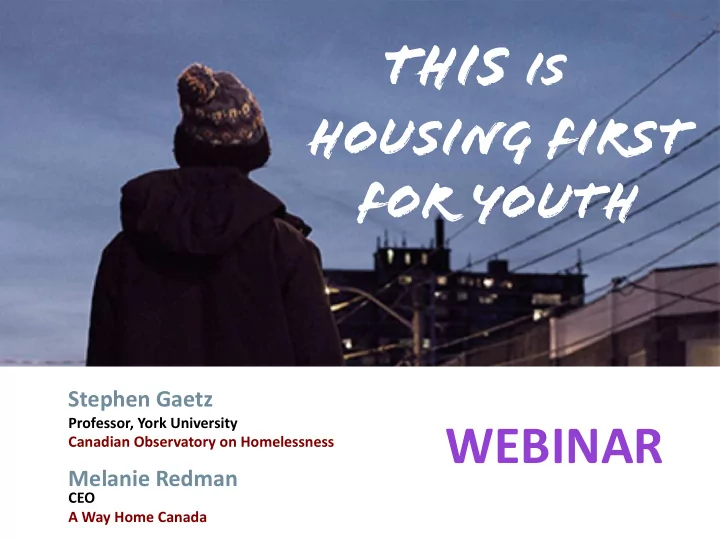

THIS is Housing first for youth Stephen Gaetz WEBINAR Professor, York University Canadian Observatory on Homelessness Melanie Redman CEO A Way Home Canada
Part 1 Why Housing First for Youth?
When we let young people become homeless …
When we let young people become homeless … • Health worsens • Mental health declines • Exploitation • Greater risk of addictions • Involvement with the law • Dropping out of school • Trauma and criminal victimization • Entrenchment in life on the streets
How are youth different from the adult homelessness population? • Age • Adolescent development • Experience • Dependency and supports
Key question: Can Housing First be adapted for youth?
“We suggest considering modifications of "Housing First" to maintain fidelity to core principles while better meeting the needs of youth”. Kozloff et al., (2016) At Home / Chez Soi
A framework for Housing First for Youth (2014)
Part 2 THIS is Housing First for Youth!
2014 2017
The importance of developing a response based on the needs of young people.
Housing First for Youth (HF4Y) is a rights-based intervention for young people (aged 13-24) who experience homelessness, or who are at risk. It is designed to address the needs of developing adolescents and young adults by providing them with immediate access to housing that is safe, affordable and appropriate, and the necessary and age-appropriate supports that focus on health, well- being, life skills, engagement in education and employment, and social inclusion.
1 A Right to Housing with No Preconditions • What does “no preconditions” mean? • Separation of Housing and Supports
2 Youth Choice, Youth Voice and Self-Determination • What does CHOICE mean? • Limits to choice? • Putting choice into action!
3 Positive Youth Development and Wellness Orientation The HF4Y model employs a “positive youth development” orientation, a strengths-based approach that focuses not just on risk and vulnerability, but also youth’s assets. A positive youth development approach:
4 Individualized, Client-Driven Supports with No Time Limits Active engagement without coercion In doing so, one must consider: • Supports must be flexible in terms of time frames. • The needs of young people will evolve over time. • What the worker thinks the young person needs or wants is not necessarily what they want for themselves. • It may take a long time to build a trusting relationship to engage in this kind of work. • Young people should be encouraged to focus on positive change and to learn from mistakes. • The importance of harm reduction • Consider the impact of trauma and disabling conditions
5 Social Inclusion and Community Integration • Housing models should not stigmatize clients • Make available opportunities for social and cultural engagement • Build natural supports • Ensure opportunities to identify and engage in meaningful activities
Part 3 Models of Accommodation & Supports
1 Help in obtaining housing ¡ Housing retention ¡ Rent supplements ¡ Support when things go wrong ¡ Aftercare ¡
2 Trauma informed care ¡ Mental Health ¡ Substance use and addictions ¡ Harm Reduction ¡ Healthy Sexuality ¡ Personal Safety ¡
3 Income supports ¡ Training ¡ Employment ¡ Education ¡
Complementary Supports 4 Life skills ¡ Adult support and mentoring ¡ Supporting young people with children ¡ System Navigation and Advocacy ¡ Peer support ¡ Legal supports ¡
5 Developing social relations ¡ Family Reconnect ¡ Community engagement ¡ Cultural engagement ¡ Meaningful activities ¡
Part 4 Considerations for Service Delivery
Good Case Management • Client driven • Effective assessment • Collaboration and Cooperation • Right matching of services • Contextual case management • Evaluation for Success
Consider the importance of Family and Natural Supports
Each youth has a primary worker but consider Shared Caseload
Working with Landords
Rent and Income Supplements
Part 5 How do we get there?
Can guide targeted Plans to Prevent and End Youth Homelessness !
In communities of any size , the response to youth homelessness can be driven by these principles.
HF4Y Program Model An Aspirational Goal
Part 6 Building the evidence base
This project is funded in part by the Government of Canada’s Youth Employment Strategy program
Making the Shift Project: Phase ONE 2 Provinces, 10 Communities, DOZENS of Community Partners
Canadian Demonstration Projects Building the Evidence Base
Housing First for Youth Demonstration Projects Ottawa: • Housing First for Youth Toronto: • Housing First for Youth (leaving care) Hamilton: • Housing First for Youth (Indigenous)
Research and Evaluation Research: • Control trial – interviews at three month intervals • Control groups in each city • Quantitative and quantitative methods • Outcomes tied to service and supports • Positive youth development orientation (strengths-based approach) Evaluation: • Developmental Evaluation • Outcomes Evaluation
Research Team Many key researchers Sam Tsemberis from At Home/Chez Soi Clinical Director
Questions or comments? www.homelesshub.ca www.AWayHome.ca
Resources A Way Home Canada Youth Homelessness Community Planning Webinar • #6: Serving Youth Better: Introducing the Youth Homelessness Assessment and Prioritization (YAP) Tool | September 2017 https://www.youtube.com/watch?v=2tWVawRwZ18&feature=youtu.be THIS is Housing First for Youth: A program model guide: • http://www.homelesshub.ca/HF4Y?_ga=2.121375695.694991686.151723 6497-29638153.1506525847
Recommend
More recommend